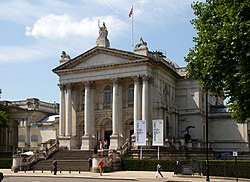British African-Caribbean people
The British African-Caribbean (Afro-Caribbean) community are residents of the United Kingdom who are of British West Indian background and whose ancestors came first from Africa. Around 566,000 people fitted that description in 2001. in the 2021 Census 623,119 people in England and Wales described themselves in this way.[1]
These people are often called Black British.
British African-Caribbean People Media
Ridley Road Market in Dalston, London, which sells African-Caribbean music, textiles, and food including goat meat, yams, mangos and spices.
Photograph of Mary Seacole, taken for a carte de visite by Maull & Company in London (c.1873)
Barbadian and Trinidadian pilots in the Royal Air Force during the Second World War.
In 1998, an area of public open space in Brixton was renamed Windrush Square to commemorate the 50th anniversary of the arrival of the ship bringing one of the first large group of West Indian migrants to the United Kingdom.
Dancers at the Notting Hill Carnival
Tate Britain, which houses works by Donald Rodney and Sonia Boyce
Diane Abbott, born to Jamaican parents, became the first black woman elected to the House of Commons in 1987.
Rio Ferdinand, whose father came from St. Lucia to Britain, is a former captain of the England national team.
Fabian Delph, of Guyanese ancestry, won the 2017–18 Premier League with Manchester City and represented England at the 2018 FIFA World Cup
References
- ↑ "Ethnic group, England and Wales - Office for National Statistics". www.ons.gov.uk. Retrieved 2023-08-09.









